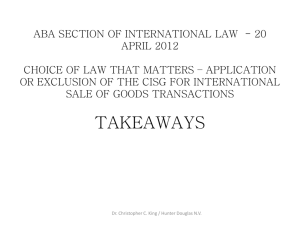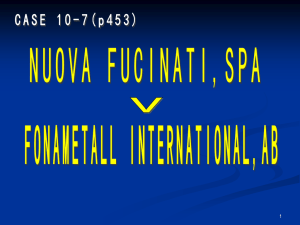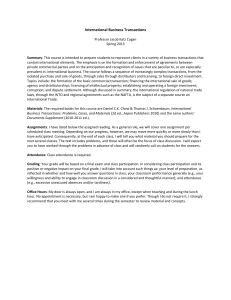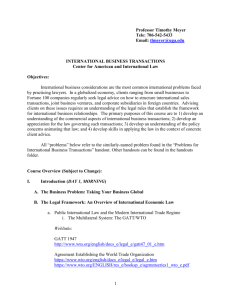LUMSA * International Commercial Law 24 february 2014
advertisement
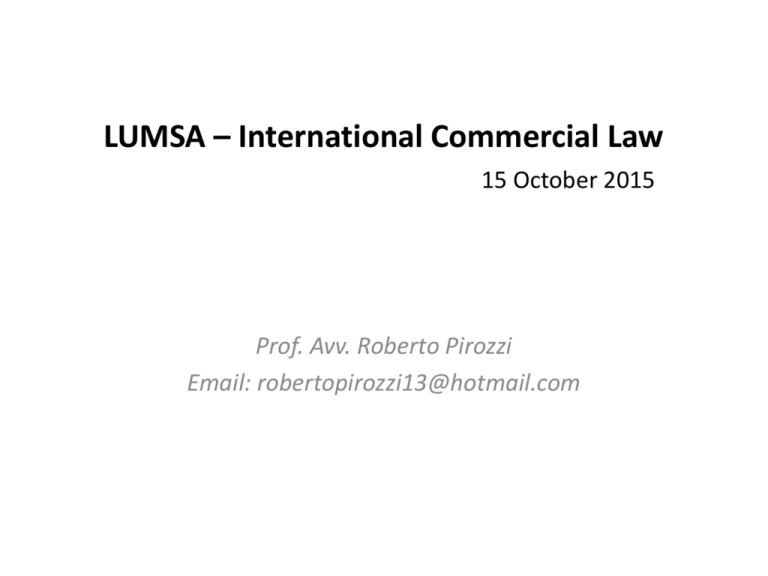
LUMSA – International Commercial Law 15 October 2015 Prof. Avv. Roberto Pirozzi Email: robertopirozzi13@hotmail.com LUMSA – International Commercial Law SCOPE OF THE COURSE 1) United Nation Convention on Contracts for the International Sale of Goods 2) American and European Antitrust Law 3) Alternative dispute resolution methods 4) Intellectual Property Rights LUMSA – International Commercial Law METHOD OF THE COURSE You are required to read the relative chapter and assigned readings before each class and come ready to discuss. These readings provide basic background information that will be referred to in class in lecture/discussion format. Important Policy Note: the only electronic devices allowed in class for notetaking purposes are tablets. Laptops, netbooks and other devices that are not viewable by the professor are not allowed in class. LUMSA – International Commercial Law METHOD OF THE COURSE Class participation will be monitored throughout the semester and is intended to mirror the kind of active discourse you should expect in the “real world”. Note: Attendance is NOT the equivalent of class participation, and perfect attendance will earn you no more than an “enough” for class participation. You must contribute to the class discussions in order to earn better than an “enough”. LUMSA – International Commercial Law METHOD OF THE COURSE We will have two exams, designed to provide an opportunity for you to show your understanding of the concepts covered. Format will be multiple choice questions and essays. The written exam will cover about the entire material. The written exam is not mandatory. The final oral exam will focus on all the material covered in the semester but draw on concepts covered throughout the course. LUMSA – International Commercial Law THE ORIGINS: LEX MERCATORIA International trade historically has been subject to numerous domestic legal systems, mainly by virtue of the rules of private international law. The disputes arising out of international sales contracts have been settled at times according to the lex loci contractus, or the lex loci solutionis, or the lex fori. This diversity has hindered the evolution of a strong, distinct and uniform modern lex mercatoria. Such legal diversity creates legal uncertainty and imposes additional transactional costs to the contracting parties. LUMSA – International Commercial Law THE ORIGINS: LEX MERCATORIA The idea of a unified international trade law represents the revival of an ancient trend towards unification that can be traced to the Middle Ages and which had given rise to the "law merchant". Historically, international trade law developed in three stages: 1) the old "law merchant", 2) its integration into municipal systems of law and, finally, 3) the emergence of the new "law merchant". LUMSA – International Commercial Law CISG The United Nations Convention on Contracts for the International Sale of Goods (1980) [hereinafter “CISG” or the “Convention”] represents the most recent attempt to unify or harmonize international sales law. The Convention is an attempt to create a uniform law for the international sale of goods. LUMSA – International Commercial Law CISG The attempt to harmonize the law governing the international sale of goods is clearly stated in the preamble which introduces the articles of the Convention. The CISG attempts to unify the law governing international commerce, seeking to substitute one sales law for the many and diverse national legal systems that exist in the field of sales. The benefits of a uniform law for the international sale of goods are indeed many and substantial, and not merely of pecuniary nature. LUMSA – International Commercial Law CISG A uniform law would provide parties with greater certainty as to their potential rights and obligations. This is to be compared with the results brought about by the amorphous principles of private international law and the possible application of an unfamiliar system of foreign domestic law. LUMSA – International Commercial Law CISG Another advantage of a uniform law of international sales of goods is that it would simplify international sales transactions and thus, as envisaged in the Preamble, "contribute to the removal of legal barriers in international trade and promote the development of international trade". The success of uniform law is successful will largely depend on: 1) whether domestic tribunals interpret its provisions in a uniform manner and, 2) whether those same tribunals adopt a uniform approach to the filling of gaps in the law. LUMSA – International Commercial Law INTERPRETATION AND APPLICATION OF THE CISG The unification or harmonization of international commercial law is generally desirable because it can act as a total conflict avoidance device that, from a trader's point of view, is far better than conflict solution devices, such as choice of law clauses. Textual uniformity is, however, a necessary but insufficient step towards achieving substantive legal uniformity, since the formulation and enactment of a uniform legal text carries no guarantee of its subsequent uniform application in practice. LUMSA – International Commercial Law INTERPRETATION AND APPLICATION OF THE CISG The main question regarding the success or failure of the Convention as truly uniform sales law relates to the proper interpretation and uniform application of its provisions as the international sales law of contracts governed by it. Several commentaries have evaluated the CISG from this perspective, and the authors have disagreed on how successful CISG will be in reaching this unifying goal. LUMSA – International Commercial Law INTERPRETATION AND APPLICATION OF THE CISG The CISG is an important legal document, since it establishes a uniform code of legal rules governing the formation of contracts for the international sale of goods, the obligations of the buyer and seller, remedies for breach of contract and other aspects of the contract. For the Convention to accomplish its objectives, it is essential that its provisions are interpreted properly. LUMSA – International Commercial Law INTERPRETATION AND APPLICATION OF THE CISG The CISG is uniform law binding buyers and sellers from different legal cultures to its set of rules and principles. Uniformity in the Convention's application, however, is not guaranteed by the mere adoption or ratification of the CISG. The political act of adoption of the CISG by different sovereign States is merely the necessary preliminary step that needs to be taken towards the ultimate goal of unification of the law governing contracts for the international sale of goods. LUMSA – International Commercial Law INTERPRETATION AND APPLICATION OF THE CISG The long process of unification of international sales law can be completed only in practice - if the CISG is interpreted in a consistent manner in all legal systems that have adopted it. In the alternative, if domestic courts and tribunals introduce divergent textual interpretations of the CISG, this uniform law will be short-lived. The practical success of the Convention depends on whether its provisions are interpreted and applied similarly by different national courts and arbitral tribunals. LUMSA – International Commercial Law INTERPRETATION AND APPLICATION OF THE CISG As the uniform law must remain responsive to the contemporary needs of the community it serves in a dynamic global market place, despite the lack of machinery for legislative amendment in the CISG, it is vital that the CISG is interpreted in a manner that allows the uniform law to develop in a uniform fashion, consistent with its general principles, so as to continue to "promote the development of international trade" well into the future. LUMSA – International Commercial Law INTERPRETATION AND APPLICATION OF THE CISG The success of a uniform law code which intends to bind parties transacting world-wide depends on the creation of an international community of people who perceive themselves as bound together and governed by a common legal system and who have some way to deliberate together over matters of continuing verification and development. LUMSA – International Commercial Law INTERPRETATION AND APPLICATION OF THE CISG It is this achievement of establishing an "international community", a kind of international legal consensus that is regarded by some as the true underlying purpose of CISG and as the key to its eventual triumph or demise. This is also the focus of the most forceful criticism of CISG, as it has been argued that international consensus on significant legal issues is impossible. LUMSA – International Commercial Law ISSUES OF INTERPRETATION IN THE CISG It is natural that disputes will arise as to the meaning and application of the CISG's provisions. The CISG, however, comes with its own, in-built interpretation rules which are set forth in Art. 7. Art. 7 is the provision that sets forth the Convention's interpretive standards. The provision in Art. 7(1) expressly prescribes the international character of the Convention and uniform direction that should be adopted in the interpretation and application of the Convention's provisions. LUMSA – International Commercial Law ISSUES OF INTERPRETATION IN THE CISG Owing to its unique nature as an autonomous and selfcontained body of law, it is necessary that CISG exist on top of a legal order that can provide doctrinal support and solutions to practical problems, such as resolving issues that are governed but not expressly settled by the Convention, as per the gap-filling provisions in Art. 7(2), in order to guarantee CISG's functional continuity and development without offending its values of internationality, uniformity mandated in Art. 7(1). LUMSA – International Commercial Law ISSUES OF INTERPRETATION IN THE CISG In order to avoid divergent interpretations of the CISG some commentators had hoped for the establishment of an international court with jurisdiction over disputes arising under the CISG. The main advantage of such a development would probably be the uniformity that a centralized judicial system can produce on disputes arising within its jurisdiction. Although the internal correlation of decisions handed down by a central judicial authority has superficial attraction, the idea has never been a realistic possibility for the CISG. LUMSA – International Commercial Law ISSUES OF INTERPRETATION IN THE CISG The risk that inconsistent interpretation could frustrate the goal of uniformity in the law is not, however, exclusive to the present structures administering justice under the CISG. All centralized judicial systems are also prone to this danger (although there is ultimately a final appellate level to provide redress). The nature of the CISG's subject matter is in itself unsuitable to the time consuming mechanism of a single judicial authority. As such, the implicit assumption is that the CISG will be applied by domestic courts and arbitral tribunals. LUMSA – International Commercial Law ISSUES OF INTERPRETATION IN THE CISG It has been suggested that a feasible solution to the problems associated with decision making under the CISG is the development of a jurisprudence of international trade. It is arguable that the success of the Convention depends on the achievement of this goal. The dynamic for developing a jurisprudence of international trade is established in Articles 7(1) and 7(2). LUMSA – International Commercial Law ISSUES OF INTERPRETATION IN THE CISG Articles 7(1) and 7(2) are arguably the most important articles in the CISG, not only because their central location and stated purpose demand detailed treatment, but also because their success, or failure, will be determinative of the CISG's eventual fate as uniform law. The debate regarding the application of the CISG generally, as well as in individual cases, necessarily involves Article 7. LUMSA – International Commercial Law ISSUES OF INTERPRETATION IN THE CISG Article 7 expressly directs that in the interpretation of CISG "regard is to be had to its international character and to the need to promote uniformity in its application and the observance of good faith in international trade". Questions concerning matters governed by the CISG which are not expressly settled in it, "are to be settled in conformity with the general principles" on which the CISG is based, or in the absence of such principles, "in conformity with the law applicable by virtue of the rules of private international law". LUMSA – International Commercial Law ISSUES OF INTERPRETATION IN THE CISG Matters governed by the CISG which are not expressly settled in it are issues to which CISG applies but which it does not expressly resolve; i.e. gaps praeter legem. It is only with this type of gap that Art. 7(2) CISG is concerned, as opposed to questions regarding matters which are excluded from the scope of CISG (such as the matters mentioned in CISG Arts. 2, 3, 4 and 5), i.e. gaps intra legem. LUMSA – International Commercial Law ART. 7(1) OF THE CISG Article 7(1) directs tribunals to discuss and interpret the detailed provisions of the text with regard to its international character and the need for uniformity in its application. If domestic courts and tribunals pay heed to the drafters' directions in Article 7 and to the spirit of equality and loyalty with which the CISG is imbued, then Article 7 will have contributed to the coherence of the precariously fragile international community. LUMSA – International Commercial Law ART. 7(2) OF THE CISG Article 7(2) provides the important mechanism for filling any gaps praeter legem in the CISG and thus complements Article 7(1) by laying the course for the text's deliberation and future development. Thus, the CISG acquires the flexibility necessary to any instrument that attempts to deal with a subject matter as fluid and dynamic as international trade LUMSA – International Commercial Law INTERPRETATION OF THE CISG The spirit of international co-operation extends to the treatment that tribunals will afford to decisions of other national courts. Article 7(1), by directing an interpreter's attention to the CISG's international character and stressing the goal of uniformity, emphasizes the need for an international discussion among different national courts. Although the CISG, once ratified, becomes part of the domestic law of each Member State, it does not lose its international and independent character. LUMSA – International Commercial Law INTERPRETATION OF THE CISG Art. 7(1) mandates that in the interpretation of the CISG one must pay close attention to three points: (a) the "international character" of the CISG; (b) "the need to promote uniformity in its application"; and (c) "the observance of good faith in international trade". The first two of these points are not independent of each other . The third point is of a rather special nature, and its placement in the main interpretation provision of the CISG has caused arguments as to its precise meaning and scope. LUMSA – International Commercial Law INTERPRETATION OF THE CISG An interpretive approach that has been suggested as suitable to the proper application of the CISG as truly global uniform sales law is based on the concept of internationality and generally acknowledged principles of commercial law, such as the UNIDROIT Principles of International Commercial Contract (“UPICC”) and the Principles of European Contract Law (“PECL”). LUMSA – International Commercial Law INTERPRETATION OF THE CISG The biggest danger concerning the interpretation of the CISG has been attributed to a natural tendency to read the international text through the lenses of domestic law. This can be the result of a conscious, or unconscious, inclination of judges to place the uniform law against the background of their own municipal law (lex fori) and to interpret the uniform law on the basis of principles with which they are already familiar, thus threatening the goal of international uniformity in interpretation LUMSA – International Commercial Law ISSUES OF INTERPRETATION IN THE CISG A nationalistic approach to the interpretation of the CISG would achieve results that are contrary to what was intended to be achieved by the creation of the uniform law and would foster the emergence of divergent national interpretations. The nationalization of the uniform rules deprives the instrument of its unifying effect.


